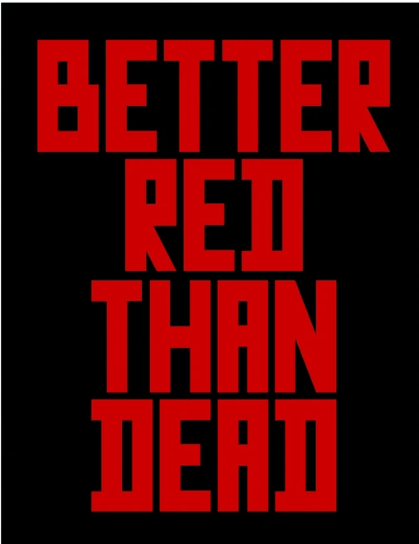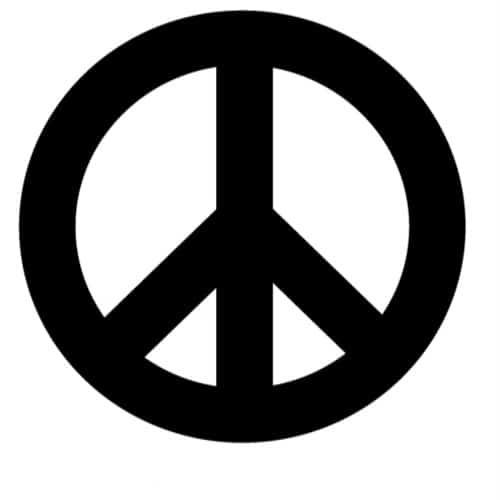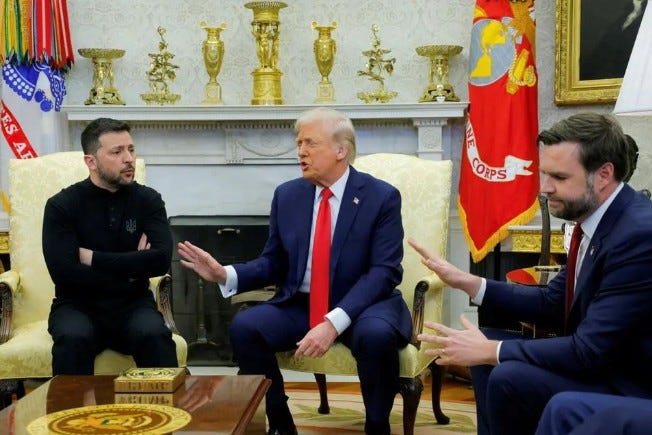Trump's apparent plan for peace in Ukraine echoes 1960s "Better Red than Dead" defeatism
During the Cold War with the Soviet Union, when there was a concern about nuclear annihilation, there was a movement advocating peace through surrender.
As a candidate, Donald Trump vowed to end the war in Ukraine in “24 hours” after taking the oath. Bringing peace—that is, the end of hostilities—is simple. Peace between a schoolyard bully and a weaker target is easy if the target throws up his hands in surrender. But then he will be forever “owned” by the bully. Ending hostilities between warring parties is readily accomplished if one side is forced to capitulate.
If you’re of a certain age, you may recall that in the early 1950s, as the Cold War with the Soviet Union heated up, Wisconsin Senator Joe McCarthy successfully elevated smoldering fears about Communism and the malevolent influence of the Soviet Union, infiltrating the U.S. Meanwhile, there were rising concerns about a possible nuclear war being initiated by the Soviets. The anxiety was that radioactive fallout would kill anyone the explosions themselves missed.
In this context, the influential British philosopher Bertrand Russell philosophized in 1958 that if "no alternatives remain except Communist domination or extinction of the human race, the former alternative is the lesser of two evils." That dichotomy was captured in the slogan “Better Red than Dead,” adopted by the Campaign for Nuclear Disarmament, which he helped found and is still active.1
Having come of age in those times, of “duck and cover” drills in elementary school,2 construction of backyard nuclear-bomb shelters, and flirting briefly with the “Ban the Bomb” movement that advocated the U.S. unilaterally disarming, I recognized President Trump’s plan to achieve peace in Ukraine by appeasing Russia as a similar piece of cloth.
Clearly, the stakes are not as high today. Ukraine’s fate is not existential to the U.S. in the short term. However, recall that Great Britain expected the Munich Agreement of 1938 would lead to peace by allowing Germany to annex the Sudetenland region of Czechoslovakia, thus appeasing what they assumed was all Hitler wanted. We know how that turned out.
“Better Red Than Dead” prioritized survival over ideology. Similarly, Trump's strategy involves prioritizing peace and ending the conflict over maintaining geopolitical stances that have maintained major powers’ peace for 80 years. By engaging with Russia and making concessions to Russia’s key demands without any reciprocity, he aims to avoid further escalation and achieve a ceasefire, even if it means aligning more closely with Russia's strategic interests.
The "better red than dead" slogan was pragmatic, focusing on avoiding war rather than adhering strictly to anti-communist principles. Trump's approach to Ukraine also appears pragmatic, as he seeks to negotiate with Russia despite previous tensions. However, unlike the Cold War era, it prioritizes ending the conflict without consideration of the key victim, Ukraine, while reversing another pragmatic stance: our maintaining a hardline stance against Russia to discourage it from further aggression.
Risks of Trump’s policy
President Trump's peace initiative with Russia undermines European Security by emboldening Russia to pursue further territorial expansion in Eastern Europe, threatening NATO's eastern flank and destabilizing the region. Moreover, the U.S. risks appearing unreliable to its European allies, eroding America’s leadership in the Western Alliance.
Most critically, it pressures Ukraine to accept Russian conditions, which would inevitably include abandoning its NATO aspirations and reducing its military capabilities. Ukraine’s sovereignty and ability to defend itself evaporates. A rushed peace deal would allow Russia to rebuild its military and prepare for future belligerence, leaving Ukraine vulnerable to renewed attacks. Ukraine would become a de facto puppet state of Russia, much as was Eastern Europe under the Soviet Union.
The best French characterization of the U.S. since Alexis de Tocqueville
Following V.P. Vance’s speech at the Munich Security Conference and the tongue-lashing doled out by Trump and Vance at the White House, Claude Malhuret3, a Senator of the French Republic, gave a speech to the Senate that captured the current moment of the character of the U.S., just as his countryman, Alexis de Tocqueville, did almost two centuries earlier4—and without having to set for in the New World to do so. If you haven’t read it, the full translated text is here.
Contrary to Kremlin propaganda, Russia is struggling. In three years, the so-called second-best army in the world has managed to gain only a few crumbs from a population three times smaller. With interest rates at 25%, the collapse of foreign currency and gold reserves, and a demographic crisis, Russia is on the brink.
The American lifeline to Putin is the greatest strategic mistake ever made during a war.
Referring to Trump and those who are in agreement with his position on Russia’s war on Ukraine, Malhuret continues:
They say they want peace. What neither they nor Trump says is that their peace is capitulation, the peace of defeat, the replacement of a de Gaullian Zelensky by a Ukrainian Pétain under Putin’s thumb. The peace of collaborators who, for three years, have refused to support the Ukrainians in any way.
The 180-degree turn in U.S. policy to side with Russia and the Trump/Vance ambush of Zelensky in the Oval Office triggered my flashback to the “Better Red than Dead” slogan. What Trump is doing is what would have been the outcome if the U.S. had implemented the capitulation to the Soviet Union in the 1960s. Peace at any cost.
This is the coward’s way out. It is the striving for a short-term political win at the expense of success from strength. For all their differences, eight U.S. Presidents—from Eisenhower to the first Bush— stood firm. Three decades after the “better red than dead” movement peaked, the Cold War ended without us having to prostrate ourselves before what proved to be the Soviet’s massive Potemkin Village. It boggles the mind that today’s America is promoting a parallel defeatist policy that we rejected in the 1960s.
In reaction, the “Better Dead than Red” advocates arose.
That is, crouching under our desks if we saw the flash of a nearby atomic bomb blast—as though that would have saved us.
Malhuret is the former mayor of the town of Vichy, a doctor and an epidemiologist, and the former head of Doctors Without Borders.
In his two volumes of Democracy in America, published in 1835 and 1840.





Completely agree, though it might not even be a short-term political win.